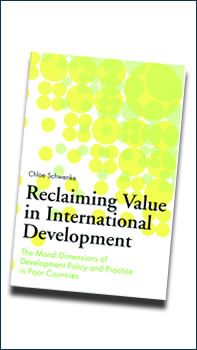[vc_row][vc_column width=”1/1″][vc_column_text]
BOOKS:
Can Virtuous Leadership Mitigate Development’s Challenges?
[/vc_column_text][/vc_column][/vc_row][vc_row][vc_column width=”2/3″][vc_column_text] A new book by Creative’s Dr. Chloe Schwenke, Reclaiming Value in International Development: The Moral Dimensions of Development Policy and Practice in Poor Countries (Praeger, 2008), is being hailed as the first book to bridge the divide between ethics and development.
A new book by Creative’s Dr. Chloe Schwenke, Reclaiming Value in International Development: The Moral Dimensions of Development Policy and Practice in Poor Countries (Praeger, 2008), is being hailed as the first book to bridge the divide between ethics and development.
International development has complex unintended effects on the realities of equity, rights, governance, and conflict in poor countries. Yet the myriad moral questions and quandaries encountered at every turn by development policymakers and practitioners are seldom thought about or articulated in a rigorous fashion. Instead, development specialists are trained to focus on the technocratic aspects of economic aid delivery and to disregard the moral issues raised by the adverse collateral consequences of aid programs for many people, communities, institutions, and environments in the developing countries.
Reclaiming Value in International Development is the first book to bridge the divide between ethics and development from the perspective of a seasoned development practitioner who is also a trained ethicist. Schwenke formally enlarges the concept of development to include its moral dimension, to denote beneficial change that alleviates human misery and environmental degradation in poor countries and reinforces universal ethical norms such as human dignity, essential freedoms, social justice, peace, civic virtue, human flourishing, the common good, gender equality, safety and security, and participation and inclusion.
She applies this ethically expanded concept to nine key topics in international development: education, leadership, procurement, food security, conflict, urbanization, gender identity and sexual orientation, deliberative participation, and the measurement of ethical performance. Throughout the book, the author draws on her thirty years of experience as a development practitioner in thirty poor countries around the world to give vivid real-life illustrations of the classic moral dilemmas in development ethics and to show how moral reasoning can clarify and resolve them.
In addition to her work as a Senior Associate at Creative Associates, Schwenke is an adjunct professor of applied ethics at the School of Advanced International Studies of the Johns Hopkins University, the Public Policy Institute at Georgetown University and at the School of Public Policy at the University of Maryland at College Park.
“We live in societies defined by interdependence and by a complex web of obligations, many of which are moral and ethical,” says Schwenke, who argues against the practice of seeing international development in purely economic terms.
To Schwenke, it falls not only on leaders, but on all, to develop a moral compass. She suggests that schools actively pursue the teaching of morals and virtue to help develop a cadre of transformational leaders. Character matters, she says.
“We want our leaders as persons of virtue – consistently and dependably to know what is right and good and to be able to explain and model this to their followers in language and actions that are persuasive and inspirational.”
— Amazon.com[/vc_column_text][/vc_column][vc_column width=”1/12″][/vc_column][vc_column width=”1/4″][vc_widget_sidebar sidebar_id=”sidebar-primary”][/vc_column][/vc_row]